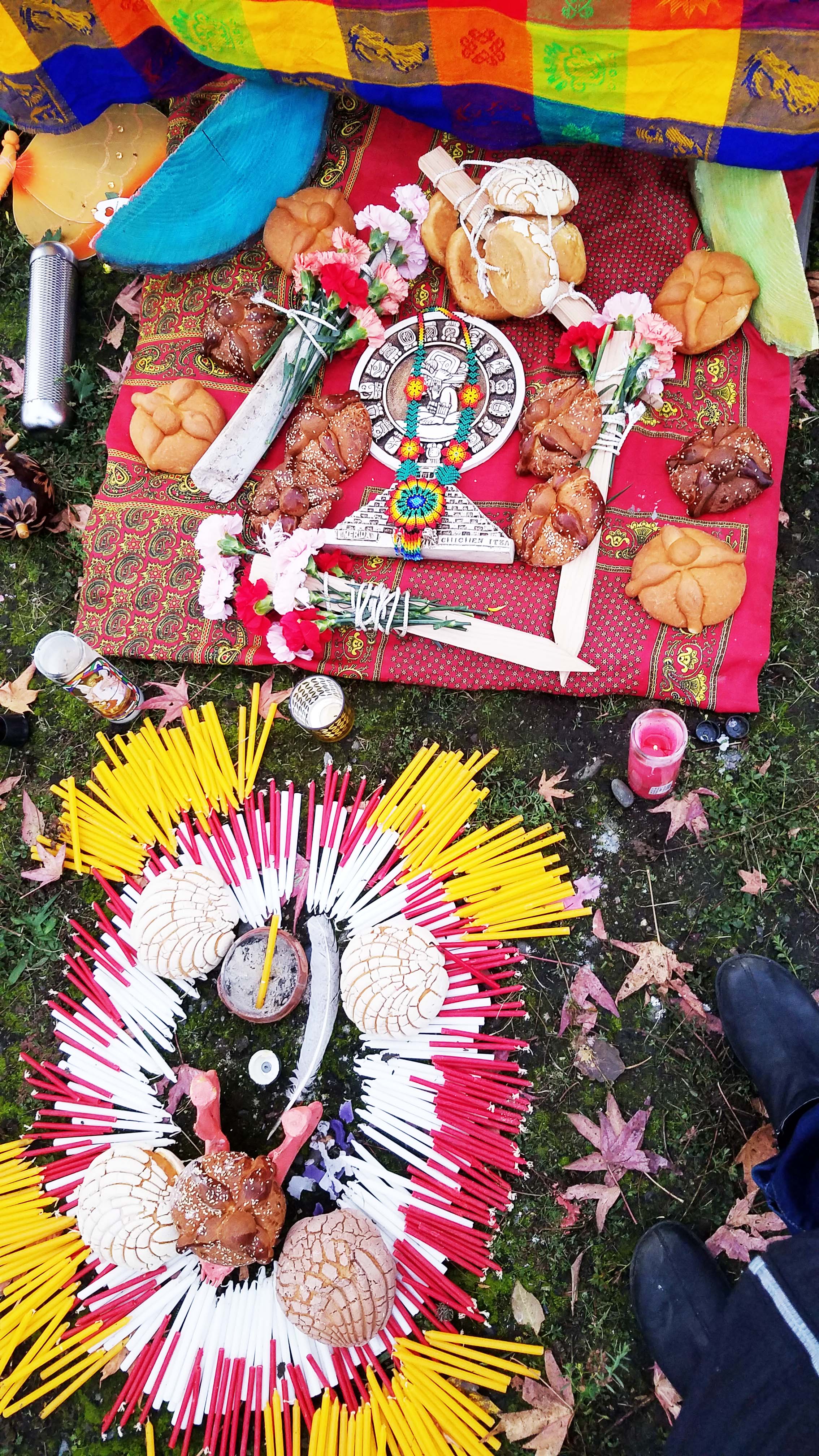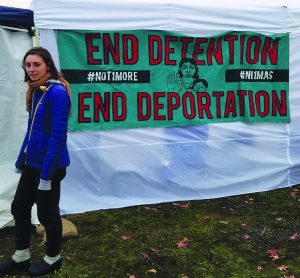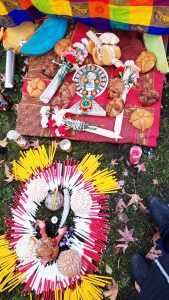
By Arcelia Salado Alvarado

It’s almost 6 p.m. on Friday when Wendy Pantoja Castillo of the Northwest Detention Center Resistance stands in the front of the makeshift hallway of tents. She turns on her microphone and the room falls silent. We’re about to hear the story of Manuel Riveron Piña, one of the hunger strikers at the Detention Center in 2017. The tone is somber as Piña’s voice crackles through the speaker.
“This whole trip started on the third of September in 2016. The trip was long and very dangerous. Many Cubans have made this trip and have not been lucky like us. They did not arrive here alive. I don’t remember their names; we lost so many in the jungle,” Riveron Piña said.
The Northwest Detention Center sits against a dreary backdrop on East J street in the Port of Tacoma. It looks unassuming, crouched in the biting November air. However, within its walls countless hunger strikes have taken place in protest of poor living conditions such as little to no medical care, the overuse of solitary confinement, outrageous commissary and phone call prices and low pay for labor within the Detention Center, according to the Seattle Globalist and the Northwest Detention Center Resistance information sheet.
Last weekend marked the Day of the Dead celebration held in protest at the Northwest Detention Center. Hosted by Northwest Detention Center Resistance, the event centered around the traditional celebration of Día de los Muertos. Volunteers used it to demonstrate solidarity with detainees as well as to portray culture as a mode of resistance and to bring awareness to the oppression undocumented immigrants experience within the detention center and around the country.
The two-day event began at around 6 p.m. on Friday, Nov. 3. The ceremony was spearheaded by Castillo, who began the ceremony by honouring the Puyallup tribe whose land the Detention Center was built on, and thanking them for the use of the land.
She explained that this Day of the Dead ceremony was based in Mayan traditions and that this year’s altar would revolve around spirituality and it would be made in honor of all of the lives lost to crossing borders and detention centers. The Day of the Dead was formed to remember the dead of Mexico and is a hybrid of Mayan and colonizing cultures.
Castillo wanted to explain the full ritual because it is so often left out of Day of the Dead celebrations.
After thanking the Puyallup tribe, Castillo asked the volunteers to help her in welcoming the spirits by placing feathers, bread and flowers onto the altar as offerings and remembrances. All of the art surrounding the altar was created by inmates who had to fight for their right to get supplies into the detention center.
Volunteers put the altar together at Castillo’s direction and listened as Castillo explained how the Mayan calendar was a reference to both time and the ancestors from which so many of these traditions came, as well as the homages to the earth throughout the altar.
Volunteers did not leave without a reminder from Maru Mora Villalpando, also of Northwest Detention Center Resistance:
“This is not a party. This is our culture,” Villalpando said.
Some volunteers stayed the night in solidarity, and as a vigil for those in Northwest detention center and those whose lives have been lost in detention centers, literally and figuratively. The lives, as well as the mental and physical health of detainees were not being cared for or about.
For part of the night, volunteers led by Castillo said prayers for families that have been separated. Volunteers stood outside of the fence that circled the holding cells, hoping detainees could hear their words and prayers.
The night dipped into the mid-30s, but volunteers had warm food and music to remind them of their freedoms.
Candle-lit faces filled the night with chants of “No están solos” — “You are not alone.”

On Nov. 4, the second part of the ceremony took place. Volunteers hung bread from a nearby tree. Signs of resistance of protest were gathered on the lawn, and candles and flowers decorated the tree.
“The altar brings back memories of the women in prison who end up killing themselves. I saw many bodies of women who had hung themselves. … Many of them were just in prison because they couldn’t post bail, or because no one came to pick them up and in their desperation they killed themselves,” Nestora Salgado, an activist wrongfully imprisoned in Mexico for two years, said.
“The fight is not just for POC; it’s for everyone. … You need to act,” Villalpando said to the audience.
“The reason I am here is because my immigrant brothers and sisters from Mexico and South America are constantly being persecuted because they try to better the conditions for their sons and daughters. … [These incredible women] are fighting for the rights of immigrants being detained in detention centers that are, in the end, financed by taxes that could be going to public schools or public infrastructure. … It’s deplorable that these detainees are deprived of liberty without having had committed any crime; it’s inhumane,” Alfonso Arellano, a volunteer, said.
After the second ceremony, 16-year-old Carmen Luthi came in with her guitar and sang and played Nina Simone’s “I Got Life,” “Cielo Rojo” by Pepe Aguilar, “Imagine” by John Lennon and “Yo Vengo Yo Ofrezco” by Mercedes Sosa.
“[These songs] carry a very strong message of resistance. … I feel like songs like ‘Cielo Rojo’ and ‘Imagine’ carry that same message of just being able to resist oppressions and being able to come together and unite in such a hard time,” Luthi said.
“One of the good things about [the Northwest Detention Resistance] is that they’re following the lead of the people who are detained and they are constantly in contact with people in the detention center and asking what they want and they need and what their next steps are gonna be, and are not trying to co-opt the movement from people who are fighting,” Philip Kendall, a volunteer, said.
“I think the the United States’ working class needs to involve themselves in social struggles, especially those of undocumented workers who must live through persecution from the police. … The working people of the U.S. needs to become aware of where their tax dollars are going,” Arellano said.
“Putting people in cages is wrong and the land can be used for so much better things than keeping people away from the sunshine and the fresh air. These borders have been open for thousands of years and it’s corporations and government money that’s keeping people out of a place and out of a nation. It’s ridiculous,” Kendall said.
The University of Puget Sound club Advocates for Detained Voices (ADV) provided part of dinner on Nov. 3. ADV’s primary purpose “is to donate our time and service toward empowering detainees and their families,” according to their Facebook page. ADV members were active in setup, cleanup and all throughout the activities in between.
The Seattle Peace Chorus Action Ensemble closed the event with group songs that had resistance woven within them. As volunteers cleaned up, it started to rain.
